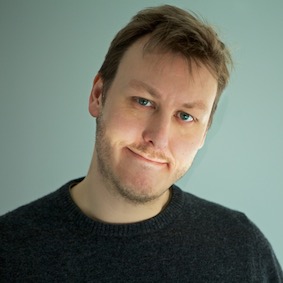Researcher Spotlight #11 - Andreas Lieberoth
Andreas Lieberoth is the next in the 'Spotlight' series of our Associated Researchers to tell us more about their background and research.

1. Hi Andreas, what is your background and job role at AU?
I'm Danish. I have lived and studied in Odense, Copenhagen and Aarhus.
I did my undergraduate education in the Study of Religion, Psychology, and Information Psychology. The latter is a mix between cognitive neuroscience and human-computer interaction. My Master's was in the study of religion. I then moved on to do my Ph.d. in psychology here at Aarhus, studying games and learning.
I'm now an assistant professor in educational psychology at the Danish School of Education and a research fellow at Interacting Minds Centre (IMC), where I work in the fusion of play, games and seriousness, as part if the PlayTrack project funded by Lego.
2. What are your main areas of research?
Media psychology, games and informal learning (including attitude formation and social information behaviours) in adults. My main line of research concerns gamification—that is the use of "sprinkles of game elements" in non-game contexts such as self-help apps and online. I'm interested in the psychological impact of games on their players—and how people use game technologies in their everyday lives.
I collaborate with game researchers across the globe. It turns out that few universities have staff who are able to combine game studies with experimental psychology, so I have a lot of opportunities to conduct field experiments and cohort studies, as well as more controlled experiments in the lab. Recently we've studied commercial computer games in the classroom, the motivational impact of different design elements in the "lecture quiz" site Kahoot!", and compared the differential impact of nudging, gamification and rational information on commuter behaviour in a large field experiment.
3. Are you involved with any teaching at the moment?
I teach different kinds of educational and media psychology at DPU and at the Department of Psychology and Behavioral Sciences, as well as research methods (mainly mixed methods and experimental research). I also teach theory of science.
I've recently been the co-organizer of an Open University lecture series on Behavior Design, meaning everything from Nudging to gamification. A few of us have associations to COBE Lab.
4. How did you hear about Cognition and Behavior Lab?
I was there from the beginning. I recall being part of the initial discussions about equipment needs and lab procedures, especialy when the lab was becoming a reality. I specifically remember debating the need for deception with Professor Alex Koch—I lost.
5. How have you used the Lab so far (types of studies)?
I've used the eye trackers for studying games. At the moment we're running studies with Lego parts. In the upcoming year I expect to use the lab for more behavioural studies, both on screens and with more Lego parts.
Apart from placing AU on the map as a place to go for both facilities and a very open and cross-disciplinary environment for experimental research, I find the combination of all the equipment, rooms, the participant pool and helpful on-site staff an awesome combination.
6. Is there a particular recommendation you would like to pass on to other researchers? Something you wish you had known before you started, or just a useful trick.
Paying participants turned out to be more tricky than I thought. I know that the procedures are in place for good reason, but working across Departments turned out to make things tricky. Make sure to plan ahead and read the Payment Policy and procedures carefully.
7. Could you recommend one academic book to fellow colleagues that you think is of great interest?
Recently I've been excited about Play Matters by Miguel Sicart.
8. Away from your research, what do you enjoy doing?
I play board games and have an obsession with professional wrestling.